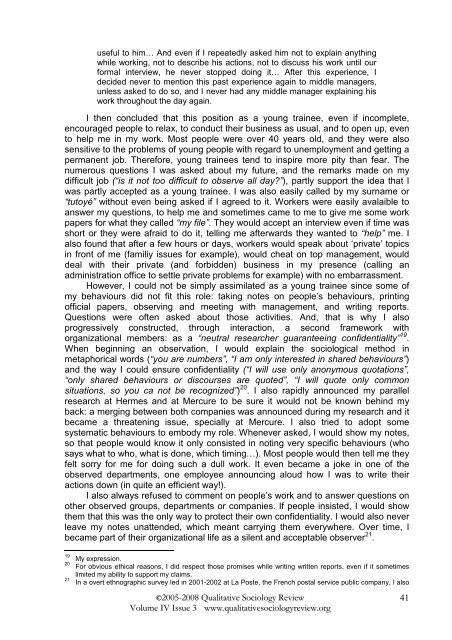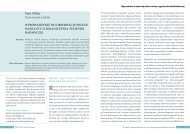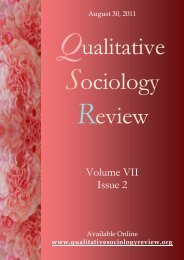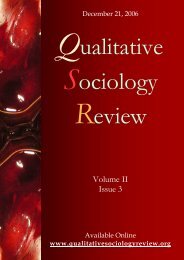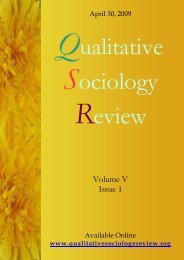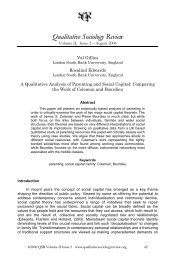volume IV is 3 - Qualitative Sociology Review
volume IV is 3 - Qualitative Sociology Review
volume IV is 3 - Qualitative Sociology Review
You also want an ePaper? Increase the reach of your titles
YUMPU automatically turns print PDFs into web optimized ePapers that Google loves.
useful to him… And even if I repeatedly asked him not to explain anything<br />
while working, not to describe h<strong>is</strong> actions, not to d<strong>is</strong>cuss h<strong>is</strong> work until our<br />
formal interview, he never stopped doing it… After th<strong>is</strong> experience, I<br />
decided never to mention th<strong>is</strong> past experience again to middle managers,<br />
unless asked to do so, and I never had any middle manager explaining h<strong>is</strong><br />
work throughout the day again.<br />
I then concluded that th<strong>is</strong> position as a young trainee, even if incomplete,<br />
encouraged people to relax, to conduct their business as usual, and to open up, even<br />
to help me in my work. Most people were over 40 years old, and they were also<br />
sensitive to the problems of young people with regard to unemployment and getting a<br />
permanent job. Therefore, young trainees tend to inspire more pity than fear. The<br />
numerous questions I was asked about my future, and the remarks made on my<br />
difficult job (“<strong>is</strong> it not too difficult to observe all day?”), partly support the idea that I<br />
was partly accepted as a young trainee. I was also easily called by my surname or<br />
“tutoyé” without even being asked if I agreed to it. Workers were easily avalaible to<br />
answer my questions, to help me and sometimes came to me to give me some work<br />
papers for what they called “my file”. They would accept an interview even if time was<br />
short or they were afraid to do it, telling me afterwards they wanted to “help” me. I<br />
also found that after a few hours or days, workers would speak about ‘private’ topics<br />
in front of me (familiy <strong>is</strong>sues for example), would cheat on top management, would<br />
deal with their private (and forbidden) business in my presence (calling an<br />
admin<strong>is</strong>tration office to settle private problems for example) with no embarrassment.<br />
However, I could not be simply assimilated as a young trainee since some of<br />
my behaviours did not fit th<strong>is</strong> role: taking notes on people’s behaviours, printing<br />
official papers, observing and meeting with management, and writing reports.<br />
Questions were often asked about those activities. And, that <strong>is</strong> why I also<br />
progressively constructed, through interaction, a second framework with<br />
organizational members: as a “neutral researcher guaranteeing confidentiality” 19 .<br />
When beginning an observation, I would explain the sociological method in<br />
metaphorical words (“you are numbers”, “I am only interested in shared behaviours”)<br />
and the way I could ensure confidentiality (“I will use only anonymous quotations”,<br />
“only shared behaviours or d<strong>is</strong>courses are quoted”, “I will quote only common<br />
situations, so you ca not be recognized”) 20 . I also rapidly announced my parallel<br />
research at Hermes and at Mercure to be sure it would not be known behind my<br />
back: a merging between both companies was announced during my research and it<br />
became a threatening <strong>is</strong>sue, specially at Mercure. I also tried to adopt some<br />
systematic behaviours to embody my role. Whenever asked, I would show my notes,<br />
so that people would know it only cons<strong>is</strong>ted in noting very specific behaviours (who<br />
says what to who, what <strong>is</strong> done, which timing…). Most people would then tell me they<br />
felt sorry for me for doing such a dull work. It even became a joke in one of the<br />
observed departments, one employee announcing aloud how I was to write their<br />
actions down (in quite an efficient way!).<br />
I also always refused to comment on people’s work and to answer questions on<br />
other observed groups, departments or companies. If people ins<strong>is</strong>ted, I would show<br />
them that th<strong>is</strong> was the only way to protect their own confidentiality. I would also never<br />
leave my notes unattended, which meant carrying them everywhere. Over time, I<br />
became part of their organizational life as a silent and acceptable observer 21 .<br />
19<br />
20<br />
21<br />
My expression.<br />
For obvious ethical reasons, I did respect those prom<strong>is</strong>es while writing written reports, even if it sometimes<br />
limited my ability to support my claims.<br />
In a overt ethnographic survey led in 2001-2002 at La Poste, the French postal service public company, I also<br />
©2005-2008 <strong>Qualitative</strong> <strong>Sociology</strong> <strong>Review</strong><br />
Volume <strong>IV</strong> Issue 3 www.qualitativesociologyreview.org<br />
41


